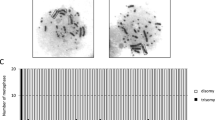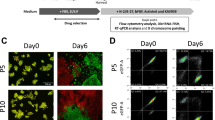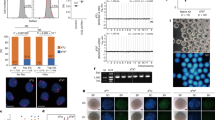Abstract
IN a female child with various morphological abnormalities and partial translocation trisomy X—haryotype: 46,XX, −22, +der(22),t(X;22)(q12;p11)mat—we have found evidence of two euchromatic X chromosomes in about 15% of metaphases from lymphocyte cultures. We believe this means that in these cells there were two active X chromosomes.
This is a preview of subscription content, access via your institution
Access options
Subscribe to this journal
Receive 51 print issues and online access
$199.00 per year
only $3.90 per issue
Buy this article
- Purchase on SpringerLink
- Instant access to the full article PDF.
USD 39.95
Prices may be subject to local taxes which are calculated during checkout
Similar content being viewed by others
References
Van den Berghe, H., Fryns, J. P., and Devos, F., Humangenetik, 20, 163–166 (1976).
Atkins, L., Santesson, B., and Voss, H., Ann. hum. Genet., Lond., 29, 89–95 (1965).
Dutrillaux, B., Chromosomes Today, 5, 395–407 (1974).
Summit, R. L., Martens, P. R., and Wilroy, R. S., J. Pediat., 84, 539–546 (1974).
Author information
Authors and Affiliations
Rights and permissions
About this article
Cite this article
BUHLER, E., JURIK, L., VOYAME, M. et al. Presumptive evidence of two active X chromosomes in somatic cells of a human female. Nature 265, 142–144 (1977). https://doi.org/10.1038/265142a0
Received:
Accepted:
Published:
Issue date:
DOI: https://doi.org/10.1038/265142a0
This article is cited by
-
Localization of the X inactivation centre on the human X chromosome in Xq13
Nature (1991)
-
Structural anomalies of the X chromosome and inactivation center
Human Genetics (1981)
-
X-autosome translocation with a breakpoint in Xq22 in a fertile woman and her 47,XXX infertile daughter
Human Genetics (1981)
-
Tandem duplication dup(X)(q13q22) in a male proband inherited from the mother showing mosaicism of X-inactivation
Human Genetics (1980)
-
A dynamic study in two new cases of X chromosome translocations
Human Genetics (1978)



